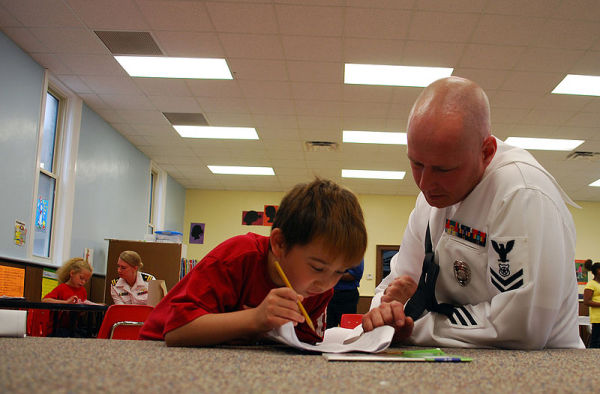Creating the copyright problem for teachers
Last week I had the pleasure to give a talk++PresentationYou can have a look at the slides I used here (Dutch only). to about 35 progressive high school teachers about Open Education, copyright and Creative Commons licenses. I have discussed this topic with teachers before, but it was the first time I came back the next day to answer any questions that arose after they had a chance to implement my tips and tricks. The result was completely disheartening and very optimistic at the same time. The issue? I may have ‘solved’ a problem for them, but they were upset I created the problem for them in the first place.
Thankfully, more and more teachers are taking control of their classes and personalising their lessons. This is not new, a lot of teachers have made copies of relevant newspaper articles for their classes for decades, or more recently have found interesting videos online to share with the class. What is relatively new is re-sharing the materials online. It is easy for teachers to create a YouTube channel, a blog, or an iTunesU course where they share materials with their students and colleagues in education. While this is an interesting trend and something to encourage, it also presents a problem: this could be serious copyright infringement.
The problem(s)
Where most countries have exceptions and limitations implemented in national legislation with regard to education, these safeguards are often irrelevant++Teresa Nobre of CC Portugal researched exceptions and limitations in European Copyright. when the teacher shares beyond the physical classroom. These exceptions have lulled teachers into a false sense of security, so to speak. Even when they are considering copyright law, they think they are covered by the education exceptions when working online. The law, however, has not yet caught up with the Internet age and does not account for virtual learning.The law, however, has not yet caught up with the Internet age and does not account for virtual learning. To give a practical example: where teachers can copy a news article from a national paper and share it with students in the classroom under the arrangement of the education exception, teachers are not allowed to scan the article and send it by e-mail to students as homework.

But there is no problem when teachers start from scratch with their materials, I hear you say, because in that case they are copyright holder and can do what they want. Alas, the Netherlands and many other countries have the rule that copyright of materials created in context of your job will automatically fall to your employer. So potentially, a teacher making his own powerpoint presentation about the growth cycle of a brown bean is infringing their employer’s copyright when posting online. Naturally this is very much dependent on the specific policies of the employer, but something tells me most policies in high schools do not allow for virtual learning and sharing either. This can become a serious issue when switching employers, having multiple employers or working part-time for publishers.
The teachers’ response
You start to understand why the teachers were less than happy with me last week. I got three different types of responses to the presentation of this problem when I spoke to the teachers afterwards:
- The ostrich: a natural reaction to being presented with a problem, is to ignore it: “I’ll deal with copyright later; I know now that I am breaking the law, but I haven’t gotten into trouble yet, so I continue doing what I have been doing.”“I’ll deal with copyright later; I know now that I am breaking the law, but I haven’t gotten into trouble yet, so I continue doing what I have been doing.”
- The convert: some have gotten the ‘open bug’ and are interested in all the open resources available to them: “I had never realised this open movement existed and have already found amazing resources that I can legally reuse.”
- The disillusioned: another natural reaction is of course to give up: “I am not going to share my materials anymore; I know sharing has many advantages to education, but I will not risk it and I do not have the time to make my material open, nor do I think that the open materials available are relevant to me.”

Naturally I was most happy with the ‘convert’ category and I tried to push the disillusioned group into thinking that being open was much easier than they thought (but let’s be serious, it is kind of time-consuming). I was not sure what to say to the ‘ostrich’ category as they will most likely not get into trouble when infringing copyright and I myself am very frustrated with the complicated and old-fashioned law. I naturally mentioned the many positive sides of OER (which I have discussed previously here), but it is hard to argue for sharing when there are often no immediate benefits for teachers besides doing good for the world.
What can we do?
This begs the question: what can we do to encourage teachers to take control of their lessons with as little confrontation with a complicated copyright framework as possible? First, we can reform copyright law to incorporate exceptions and limitations that make it possible for teachers to do their job in modern times. While Brussels is working on copyright reform, this will most likely take several years and has the potential to turn out worse for education. So perhaps not wait for this option. Second, we can educate teachers on how to be open, what materials they can freely reuse and point them towards the great materials already transformed into teaching tools. Lastly, we can put policies in place in institutions or learning that back teachers in trying to be open++Have a look at the Creative Commons OER-policy project.. This means time to create and remix materials, clear guidelines on the ability to share and a realisation that creating own materials is a great opportunity for professional development, and should be rewarded.
I hope that the teachers I spoke to will continue to investigate being open and creating their own materials. Meanwhile, I am very curious whether there are schools that already have clear Open Education policies, or have implemented different solutions to this issue. Let me know at lk@kl.nl.



